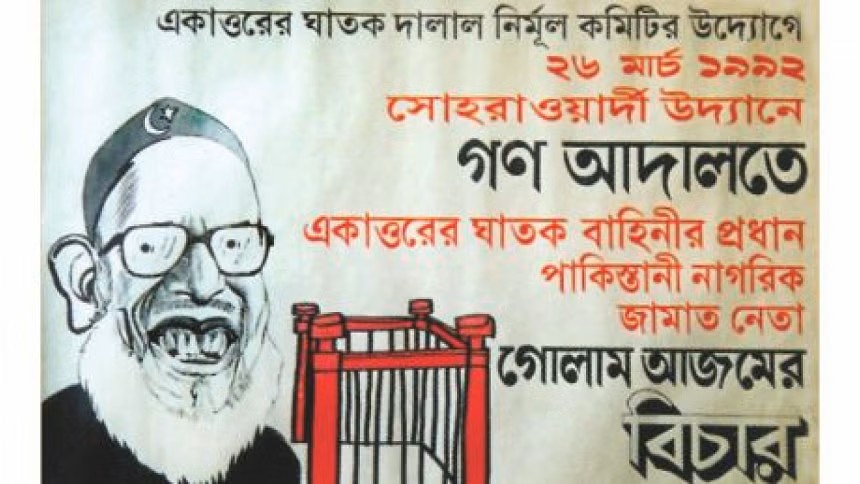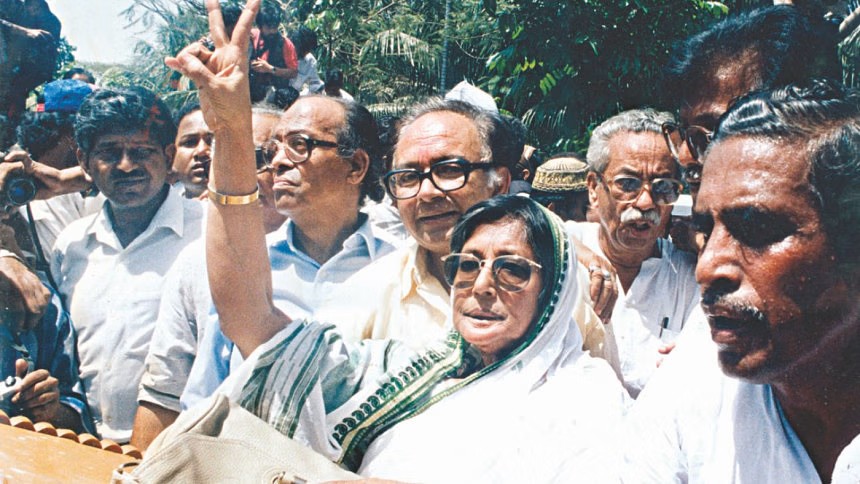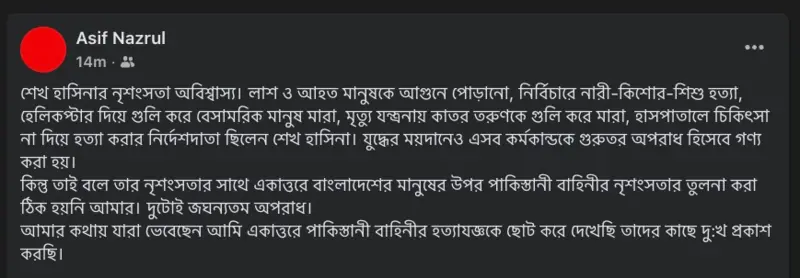Dhaka University teacher Prof Dr Asif Nazrul was a journalist and war crimes trial activist until 1992, when Jahanara Imam formed the Ghatak Dalal Nirmul Committee and launched a campaign to try Razakar guru Ghulam Azam in a public court, called Gano Adalot.
At that time, the pro-Jamaat BNP filed a sedition case against Jahanara Imam and 23 others to stop their movement. Meanwhile, amid an investigation into the allegations against Azam and seven Razakar leaders, Nazrul Islam alias Asif Nazrul handed over some important documents to the then chief of the DU Law Department, Ershadul Bari, and went abroad for higher studies.

The movement stumbled because of the sedition case alongside intimidation by the BNP government, Jamaat-Shibir, radical Islamist groups and Pakistan-backed militants.
After coming to power in 2009, the Awami League government started the trial of war criminals, mostly linked to the radical Jamaat-e-Islami, who aided the Pakistan Army in carrying out genocide against the Bangalis. Jamaat-Shibir, like-minded Islamist groups, and militant outfits started killings and violent demonstrations to foil the trials.
At that time, Nazrul started criticising the tribunal in a coordinated manner with some other pro-Jamaat actors in the civil society and the media.
He was also a critic of the Awami League government through his speeches on TV and in newspaper columns while praising Bangabandhu and Sheikh Hasina and recognising the 1971 genocide.

In 2021-22, Dhaka University students campaigned against Nazrul for supporting jihadist ideologies and working for the Pakistani spy agency, ISI.
During the anti-government movement last year, he coordinated among teachers, journalists, civil society members and foreign diplomats alongside advising student leadership. After the government changeover, he became the law adviser but has since been criticised for controversial and unlawful activities and revenge attacks on the Awami League, journalists, freedom fighters, and war crimes trial supporters and awarding impunity for July-August atrocities.

He has adopted a policy of filing wholesale murder cases against his opponents and denying their requests for bail. Elderly freedom fighter and Nirmul Committee leader Shahriar Kabir, who gave Nazrul the job at the Weekly Bichitra, has been languishing in jail for months.
Moreover, the International Crimes Tribunal (ICT-BD) Act has been revised to try the Awami League leaders and the party for alleged crimes in 2024. As a result, Nazrul has halted the trial of war criminals.
Meanwhile, death-row convict Razakar, Jamaat leader ATM Azhar, was acquitted using the court in May, while another convict, Mobarak, a Razakar from Brahmanbaria, was given bail on Wednesday.

Earlier, Lashkar-e-Tayyiba member and Hefazat-e-Islam leader Mufti Harun Izhar, a top militant previously associated with the banned HuJI-B, met with Nazrul to ensure the release of all religious leaders and activists, including Farabi. Nazrul accepted the request.
Nazrul has also facilitated the bail of some radical Islamists and militants, including al-Qaeda cleric Jasimuddin Rahmani. Another top instigator of the blogger murders from 2013-16, Shafiur Rahman Farabi, was freed on Wednesday.
The government is also pondering the acquittal of Major (sacked) Syed Ziaul Haque, who was sentenced to death in the Avijit Roy murder case. Farabi was given a life term sentence in the same case.
Golam Faruk Ovi, a top terror of Dhaka University Chhatra Dal, was Nazrul’s icon after he entered the campus. He also joined the group because of his desire for power and wealth. In Nazrul’s first novel, “Campuser Nayok,” he portrays Ovi as the hero.
In January this year, a Dhaka court acquitted Ovi in the model Syeda Tania Mahbub Tinni murder case—thanks to Nazrul’s interference in court affairs.
Love for the Pakistan Army
While the Jamaat-backed interim government continues to empower radical Islamists and improve relations with Pakistan, Nazrul takes the privilege of an adviser to slander the Awami League and its leadership now and then.

On July 29, while speaking at a discussion on the 2024 movement, Nazrul termed the killings during the protest genocide and said the crimes committed by Prime Minister Sheikh Hasina and her cronies were more severe than those committed by the Pakistani Army in 1971.
Then, at around 7:30pm, Asif Nazrul wrote on his Facebook ID that it was not appropriate to compare Sheikh Hasina’s atrocities with the atrocities of the Pakistani military. “Both are the most heinous crimes. I express my apologies to those who thought that I was belittling the massacre of the Pakistani army in 1971.”